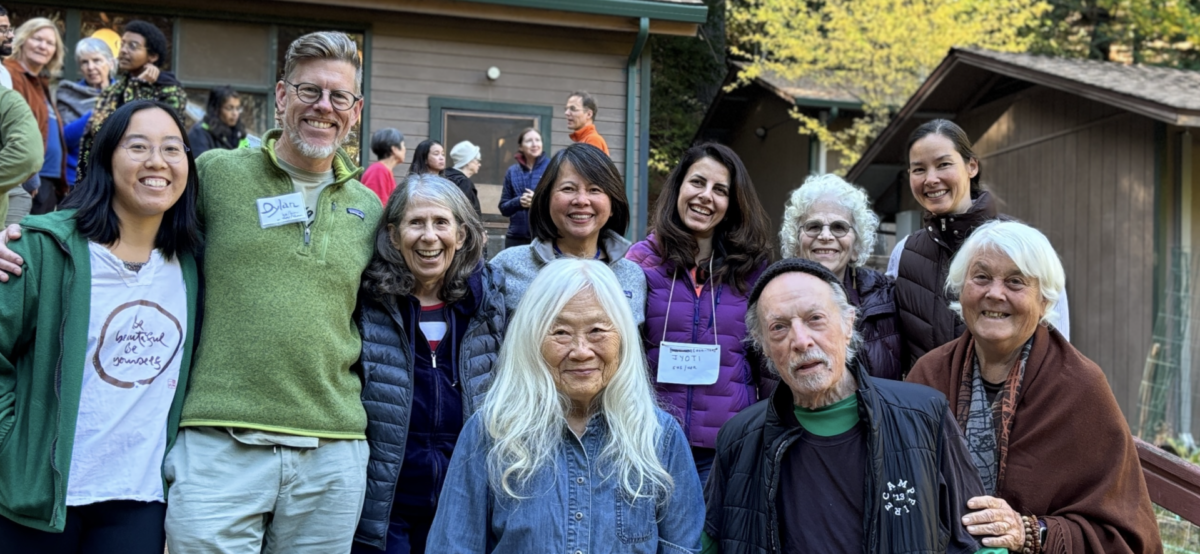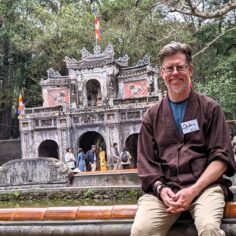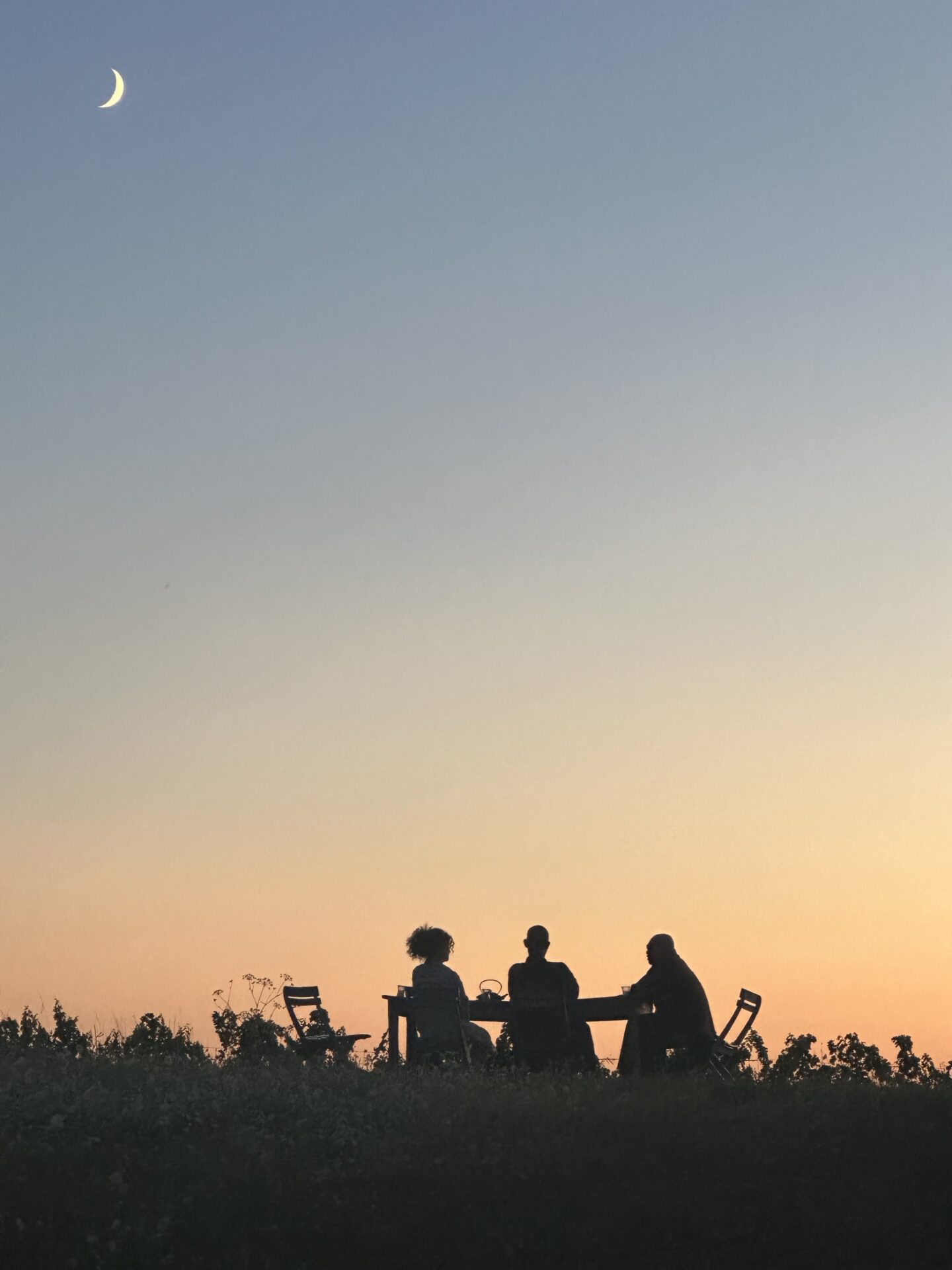D. F. Tweney embraces the support and wisdom of Dharma teachers as a retreat facilitator
By D. F. Tweney on
The rising sun shines through the branches of the redwood trees and warms their trunks, which steam in the chilly morning air. Sparrows chirp and jays squawk among the trees on the other side of the lawn. In another direction, a raven speaks out with a single,
D. F. Tweney embraces the support and wisdom of Dharma teachers as a retreat facilitator
By D. F. Tweney on
The rising sun shines through the branches of the redwood trees and warms their trunks, which steam in the chilly morning air. Sparrows chirp and jays squawk among the trees on the other side of the lawn. In another direction, a raven speaks out with a single, confident, bell-like “Cronk!”
It’s midmorning on the second day of a retreat at the Quaker Center in the hills above Santa Cruz, California, US. Fifty Plum Village practitioners have gathered to practice for Veteran’s Day weekend. It’s the same place where, before the pandemic, veterans and mindfulness practitioners came together for more than a decade of annual writing retreats. Now, after a five-year pause, Melanie Gin and I have helped revive the retreat.
During the retreat, our teachers—Wendy Johnson, Maxine Hong Kingston, and Earll Kingston—bring those veterans to mind over and over again, making them felt even in their absence. They also share stories of Thích Nhất Hạnh, stories that convey a feeling of his personality even for those of us who never met him.

We are on land that has been cared for by the Quakers for seventy years; before that, it belonged to a series of Spanish, Mexican, and then American owners. Before that, it was tended by the Ohlone people, who lived here for thousands of years.
Wendy tells us that the hills we practice in represent a unique ecosystem, a merging of oak and redwood forests that sustains an astounding variety of plant and animal life. I realize I’ve been aware of only a tiny sliver of the glittering rainbow of being that surrounds me.
Maxine shares a story: when she was growing up, a neighboring family would leave their porch light on at night so her family would have reassuring illumination as they walked past on their way home from the shop they ran. These neighbors were Japanese Americans, home again after being incarcerated by the US government—and after the end of a war between the two families’ ancestral countries, China and Japan. Maxine still remembers this kindness more than seventy years later.
Maxine tells us: “An act of love I do this morning may save a life on a future battlefield, and someone’s act of kindness 1,000 years ago may save your life today.” She shares how a stranger, Mrs. Lum, sheltered two young refugee princes over 1,400 years ago, after the fall of the Song Dynasty. Mrs. Lum told the conquering soldiers that the refugees were her own children, and in doing so saved their lives. The princes were Maxine’s ancestors. Ever since then, she says, her family has always shown gratitude to anyone named Lum (or its variants, Lim and Lin). When I tell her later that I studied Chinese in grad school and was given the Chinese name Wei Di Lin, Maxine bows down and touches my shoes.
On the last morning of the retreat, Wendy, Maxine, and Earll huddle in a circle and talk quietly. Melanie and I stand to one side, waiting for a chance to discuss a schedule change with them. We disagree about the change, and I feel some agitation and a sense of urgency to resolve the question quickly. But we don’t want to interrupt these elders, this circle of old friends sharing a moment, so we wait patiently.
Then Wendy notices us. She and Maxine turn and wave us into the circle. Wendy puts her arm around me. My body immediately settles, and a palpable wave of warmth spreads through me. I feel relief and acceptance from her encircling arm and from standing in this circle of elders. Melanie and I share our concerns, and the question is quickly resolved.
Before the retreat, Wendy told me several times that I am an “elder in training,” and now, standing in the circle with these three wonderful teachers, I finally feel that in my heart.
For this retreat, a sort of intergenerational division of labor has emerged. Melanie (Wake Up age) and I (a member of Gen X) are the organizers, while Wendy, Maxine, and Earll (all Baby Boomers) are the teachers. Retreat attendees include these three generations. Melanie and I see part of our role as attending to these elders: helping them feel comfortable and taking care of procedural issues so they can focus on being present and offering their teachings to everyone in the retreat.
Afterward, Maxine and Wendy tell us how much they appreciated this arrangement. “I felt like a well-tended guest,” Wendy says in our post-retreat Zoom meeting, and Melanie and I beam with happiness.
In time, Wendy says, those who are facilitators now will become elders and teachers, and then it will be a new generation’s turn to organize and facilitate. Until then, as an elder in training, I have the great privilege of learning from today’s elders by supporting and serving them.
This model is similar to that of monastic communities, where elder monks and nuns have attendants who support them and who learn the elder’s ways and wisdom through close, daily contact. While monastics do this over long time periods, laypeople might only have the time it takes to organize a day of mindfulness or a retreat. During this time, though, elders can share their wisdom and experience, and younger folks and elders in training can offer their energy and organizational capabilities.
By working together, we can create more inclusive sangha events that facilitate the transmission of wisdom from one generation to another. When multiple generations come together like this, we create opportunities for the transmission of wisdom and energy, in all directions.


